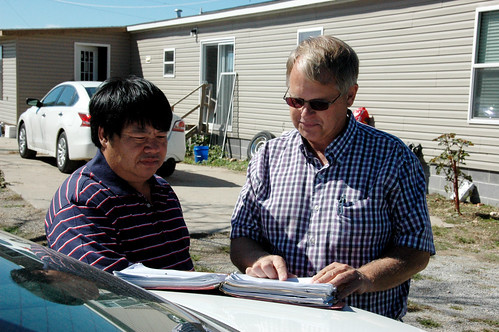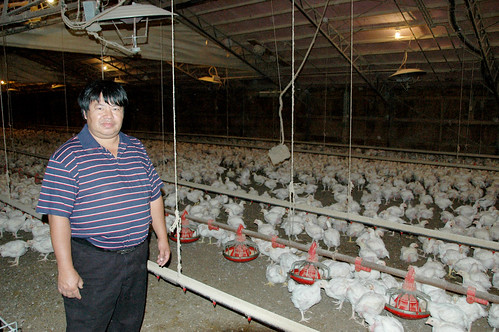
Kao Her is a self-taught poultry farmer. Everything he knows about poultry farming he learned over two weeks with the farm’s previous owner and nine years of on the job trial-and-error.
“I’ve learned a lot by mistake,” said Her, a member of the Hmong community. “My cousin always told me to do my research before getting into something new. But that’s never been my way of doing things.”
Her houses 235,000 broilers, or meat chickens, in six poultry houses in the small town of Noel, Missouri, located just six miles northeast of where Missouri, Arkansas and Oklahoma intersect. He walks three miles a day through his 500-foot and 600-foot houses checking on the chickens that help provide for his family. Since beginning his Class 1 poultry operation in 2005, Her has raised chickens for local commercial poultry operator, Simmons.
Born in Laos in 1960, Her was raised in a Hmong farming community. During the Vietnam War, Her said his father, a soldier, fought alongside the United States. As American troops began pulling out of the country in 1975, Her and his family were forced into hiding in the remote, mountainous jungles of Laos.
“Once we moved into the jungle, we cut off all connection with the outside world until 1978,” Her said. “We lived off of the jungle, but the jungle isn’t a good place for farming. We couldn’t grow what we needed.”
In 1978, Her’s uncle, a Christian Mission Ally, helped Her and his family escape to Thailand where they stayed until moving to Ottawa, Illinois. His family later moved to Wisconsin.
For several years, Her picked up work in housekeeping and auto shops, learning English on the job and through English as a Second Language classes. In 1989, Her was offered a job at Kraft Foods.
Firmly believing that he would retire with Kraft, Her was surprised when he received a call in February 2005 from a cousin who was curious if Her had ever considered going into poultry farming.
After some consideration, Her and his family began a Memorial Day road trip to North Carolina with intentions of purchasing a poultry farm. Plans changed en route upon learning that the farm was no longer for sale.
“We were in St. Louis trying to figure out what to do next when I heard about a poultry farm that was for sale in Noel, so we went down and looked at it,” Her said.
At the time of purchase, the farm contained four 500-foot poultry houses, a makeshift composter for bird carcass disposal and a dry poultry litter stacking shed which weren’t in compliance with waste management plans. With assistance from USDA’s Natural Resources Conservation Service, (NRCS) he was able to upgrade his facility.
“Kao really needed a better stacking shed on his property,” said Lynn Jenkins, who worked as a district conservationist with NRCS in the area. “What he had wasn’t exactly ideal.
“We worked with him to develop a stacking shed that provides the necessary cover allowing the litter to stay dry while keeping nutrient runoff to a minimum. The same goes for the composter that was on his property when he bought it. He needed something better for his size operation.”
The Environmental Quality Incentives Program, or EQIP, provided technical and financial assistance to build a new stacking shed and a composter, two conservation practices that NRCS often provides to chicken farmers. These practices help reduce the runoff of nutrients, which can have negative impacts on water quality.
The Hers have a close relationship with their local NRCS office, receiving financial assistance through EQIP to construct a high tunnel on their 61-acre farm. Her’s wife, Mao, has an extensive garden and can extend the growing season of her fruits, vegetables and flowers inside the high tunnel. Mao sells her items at the local Bentonville Farmer’s Market.
The Hers are planning additional work with NRCS in 2015. Earlier this year, Her’s poultry farm underwent an energy audit, a step necessary to apply for EQIP energy efficiency upgrades. The audit, completed by a technical service provider, assessed the operation’s lighting, heating and ventilation systems and determined the estimated annual savings through energy efficient upgrades.
“My wife suggested once that I sell the farm and take a new job. But, I’m too old for that!” Her said laughing. “I want to stay with this for as long as I can. I was born and raised on a farm and have many fond memories of farming. I enjoy what I do.”

